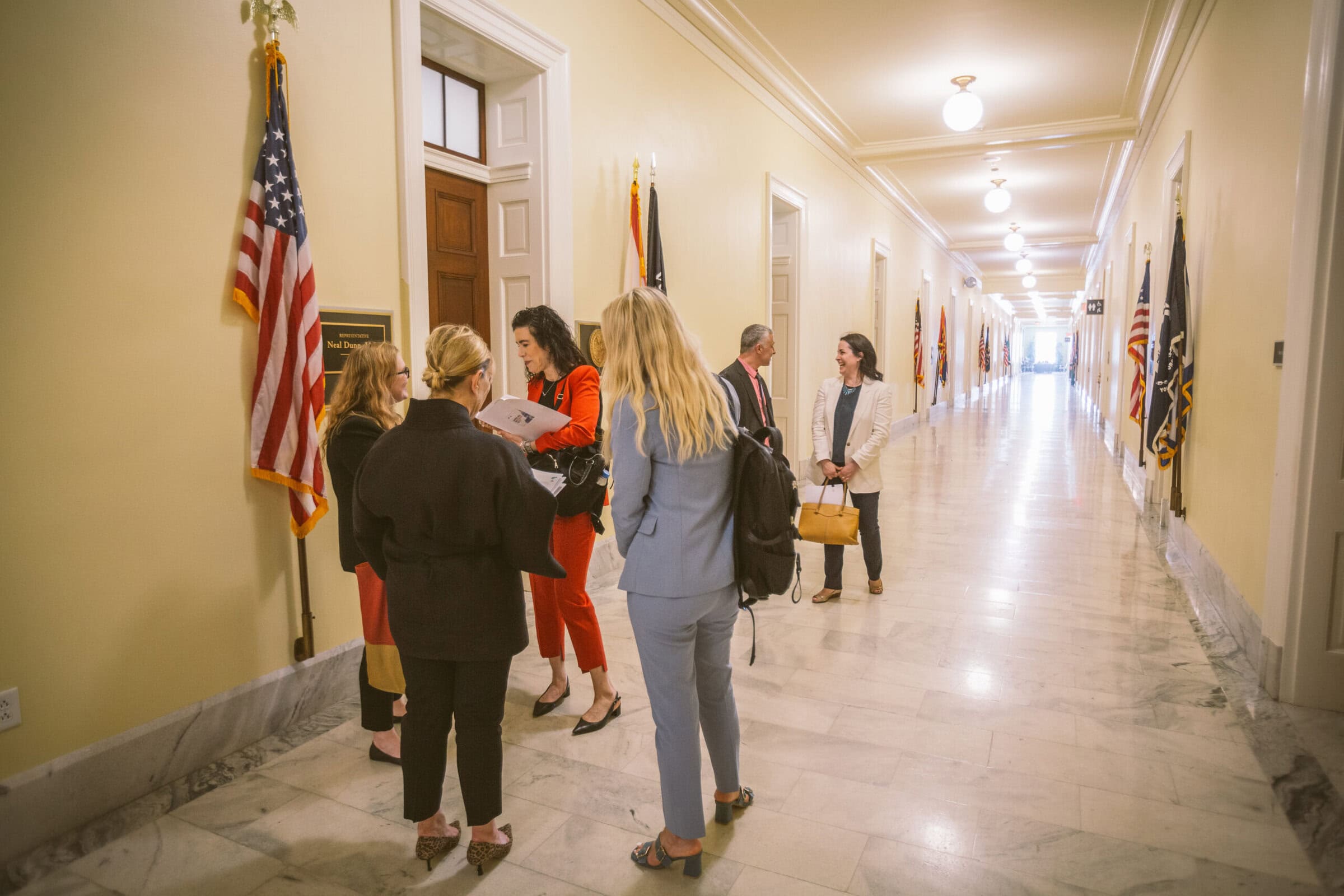Topic
- Government Relations
4As Introduces New Sustainability Task Force
With the conclusion of the COP26 Climate Summit in Glasgow, it’s become abundantly clear that it can no longer be business as usual. Governments, citizens, and increasingly businesses are calling for climate action in every touchpoint of the economy. But what does that mean for agencies? What should agencies be doing in the face of these new pressures, and where can they best focus their efforts to not only better serve their client’s needs, but to improve their own internal practices?
To that end, the 4A’ is excited to announce a new Sustainability Task Force exclusively focused on these issues. By bringing together agency leaders currently working to tackle these problems, the task force will work on solutions to address some of our industry’s most pressing challenges. Areas of focus could include, but are not limited to:
- Create a framework for agencies to use when thinking about what kind of clients they work with in the face of ongoing pressure from employees and external groups.
- Create new templates to help agencies streamline responses to RFPs requesting more information about their sustainability efforts.
- Work to inform regulatory comments to the Federal Trade Commission (FTC) as they revise their Green Guides for the first time in a decade.
- Understand how new business models and ecolabel certifications like B-corp can benefit agencies.
The 4As Sustainability Task Force will begin meeting in January 2022.
For more information, please contact Alison Pepper at [email protected].
4As Submits Comments on Proposed Regs. for Implementing Maryland Digital Ad Tax
On November 8, the 4As submitted written comments to the proposed regulations issued by the Maryland Comptroller to guide implementation of the state’s new digital advertising tax. The nation’s first digital advertising tax impacts large companies that sell digital advertising and is imposed on a graduated scale (from 2.5% to 10%) based on total global revenue. Taxation does not accrue for any entity with less than $1 million of gross digital advertising revenues in Maryland and $100 million in annual gross revenues.
Important for agencies, earlier this year the legislation’s lead Senate sponsor and President of the Maryland Senate, Bill Ferguson (D-46), clarified that he doesn’t believe that the tax would be levied against a company reselling ad space to a marketer client; instead, he explained that the legislative intention of the bill is to tax the digital company selling the original advertising space (i.e. Facebook, Google, etc.).
Maryland’s digital advertising tax is scheduled to take effect on January 1 2022, if it does not fall to any of the serious legal challenges facing it in the courts. Final regulations on implementation of the Maryland digital advertising tax could be expected as early as late December 2021.
For any questions or to learn more, please reach out to Alison Pepper, 4As, EVP – Government Relations, at [email protected].
Democrats’ Build Back Better Bill Passes House; Senate Negotiations Chug Along
This week, House Democrats passed the Build Back Better Act (H.R. 5376), a key component of President Biden’s domestic policy agenda. The Senate is not expected to take up the measure until at least the second week of December due to the need to address other high priority legislative items including passing the FY 2022 defense spending bill and funding the federal government past Dec. 3. Negotiations are also still ongoing with Senate Democratic moderates to shore up their support for a final legislative package.
Specifically for agencies, the proposed bill’s labor provisions might be worth keeping an eye on as a final bill is negotiated and approved by the Senate parliamentarian, including:
- Paid Leave: The House version of the bill includes four weeks of paid family leave. This is still a key area of negotiations, so it may be stripped from the final version of the bill in the Senate.
- Punitive Penalties Created for ULPs: Authorizes the National Labor Relations Board (NLRB) to issue civil penalties of up to $50,000 for each unfair labor practice (ULP) committed by an employer and up to $100,000 for certain repeat violations. NLRB would consider “public interest” in assessing the penalty amount. The bill would also permit civil penalties to be assessed against individual directors or officers of an employer. If enacted, the monetary penalties could give unions a major source of leverage in infiltrating non-union workplaces, allowing the government for the first time to fine employers for violating workers’ rights.
- Minimum Wage Violations Penalties Increased: Increases fines on employers that repeatedly or willfully violate federal minimum wage or overtime prescriptions from $1,100 to $20,740.
- Workplace Safety Penalties Increased: Increases the maximum penalty for a willful or repeat workplace safety violation from $70,000 (currently adjusted for inflation to $136,532) to $700,000, and the minimum penalty would increase from $5,000 (currently adjusted for inflation to $9,753) to $50,000. Caps on serious violations and failures-to-correct violations would increase from $7,000 (currently adjusted for inflation to $13,653) to $70,000.
A section-by-section summary of the bill can be found here.
OSHA Rule Issued for Federal Vaccine Mandate for Large Employers, Then Stayed
On November 5, the Occupational Safety and Health Administration’s (OSHA) published its emergency temporary standard (ETS) that provides more details on implementing the Biden Administration’s COVID-19 vaccine mandate for large employers. On November 6, 2021, the United States Court of Appeals for the Fifth Circuit granted a legal stay of the ETS, pending further legal review. On the same day, OSHA announced that it “has suspended activities related to the implementation and enforcement of the ETS [Emergency Temporary Standard] pending future developments in the litigation.” The future of the ETS remains dubious due to pending legal challenges. While the final result is unknown, it will take weeks of planning for employers to comply with the ETS’s deadlines. Accordingly, agencies may want to continue preparing for the ETS as if it is going to take effect while litigation continues. To date, 16 states have sued or plan to sue over federal vaccine mandates.
Under the original ETS, employers with 100 or more employees must require employees to either be vaccinated or present a negative COVID-19 test weekly and wear a face covering while indoors. The ETS would have required employers to pay employees for time spent getting vaccinated and recovering from side effects, but would not require employers to pay for weekly COVID tests for unvaccinated workers. The current ETS also mandated that employers must meet the majority of their ETS obligations by December 6, 2021. The requirement for testing for employees who are not fully vaccinated would have begun on January 4, 2022. If the ETS stands up to legal muster, strict OSHA enforcement is expected with max. $13,650 fine per violation or $136,500 for willful or repeated violations. A summary of the rule and FAQ doc were also issued.
Also worth noting, the U.S. Equal Employment Opportunity Commission (EEOC) recently updated its COVD-19 guidance “addressing questions about religious objections to employer COVID-19 vaccine requirements and how they interact with federal equal employment opportunity (EEO) laws.”
New Data Privacy Bill Based on ULC Text Introduced in DC
Recently, the DC City Council became the first jurisdiction to introduce the Uniform Law Commission’s (ULC) Uniform Personal Data Protection Act (UPDPA), a model data privacy bill designed to be promulgated in state legislatures across the country. Agencies operating both within or outside of the District of Columbia should monitor developments with the UPDPA legislation because the National Conference of Commissioners on Uniform State Laws is actively soliciting the UPDPA’s adoption in other states. If adopted, the legislation has broad coverage applying to all entities collecting personal data on 50,000 data subjects in DC or those earning more than 50% gross revenue as a controller or processor in DC. Moreover, due to definitional differences within the UPDPA, existing state privacy laws base their scoping thresholds on a much wider range of data practices.
Key features of the UPDPA legislation include:
- Data subject rights, such as the right to access and correct personal data and the right to nondiscrimination;
- A data practices framework, defining uses of data that are either compatible, incompatible, or prohibited under the UPDPA (a key substantive difference from other state privacy laws in VA, CO, and CA);
- Enforcement and rulemaking by the state’s attorney general, with no private right of action
The UPDPA varies in significant ways from existing state comprehensive privacy legislation in California, Colorado, and Virginia. For example, the definition of “personal data” is more limited in scope than existing state privacy laws and is defined as “a record that identifies or describes a data subject by a direct identifier or is pseudonymized data.” Another major differentiator is that the UPDPA only provides data subjects the right to copy and correct personal data, not delete data as other state bills do. Finally, compliance with another state’s law is considered sufficient if the DC Attorney General determines that such law provides for equal or stricter data protection, and the Attorney General may charge for its cost in making such determination.
The bill has now been referred to the Committee on the Judiciary and Public Safety.
ICYMI: Tax Foundation Sponsors Mobile and Remote Workforce Income Tax Simplification Webinar
Agencies are facing new tax compliance challenges as a larger portion of their workforces are working remotely either temporarily or permanently. Depending on circumstances, some agencies may not experience a large increase in overall income tax liability with the rise of telework, but they may need to be diligent in ensuring their income is apportioned correctly to states where new remote employees are based. In particular, agencies’ primary concerns may center on income apportionment and withholding obligations for employees.
The Tax Foundation in partnership with H&R Block and the Eversheds Sutherland recently produced a helpful webinar with associated materials which explains the everchanging compliance in this area, highlighting policy issues such as the “convenience rule”, telecommuting nexus, sales and use tax considerations and more.
We highly recommend a listen.
House E&C Committee Republicans Introduce Discussion Draft of Federal Privacy Legislation
On November 3, House Energy and Commerce Committee Ranking Member Cathy McMorris Rogers (R-WA) and Consumer Protection and Commerce Subcommittee Ranking Member Gus Bilirakis introduced a legislative draft framework to establish a national data privacy standard.
The new draft House bill does not include a private right of action, requires data brokers to register with the Federal Trade Commission (FTC), and preempts existing state privacy laws. Consumer rights given in the draft bill include the ability to correct, confirm, access, delete and opt-out of sharing their personal information and a strict opt-in requirement for the sharing and processing of a consumer’s sensitive information.
To help with overseeing enforcement and rulemaking for this legislation, the draft bill would create a Bureau of Consumer Privacy Protection and Data Security within the FTC, a policy proposal also generally supported by Democrats. The Bureau will also be charged with educating consumers of their rights and providing guidance for organizations.
In its current iteration, the draft bill also includes an important distinction between larger entities and small to medium sized entities for determining the amount of civil penalties for consumer privacy violations.
Members of the Consumer Protection and Commerce Subcommittee will continue to lead the development of the draft legislation focusing on specific areas of the framework, including:
- The creation of a Bureau of Consumer Privacy and Data Security, and how the FTC will implement transparency requirements
- How “legitimate purpose” is defined for companies, and how companies handle the retention of information
- Risk assessment and mitigation techniques
- The need for one national standard and avoiding conflicting regulations
- Privacy-by-design policies and procedures
- Categories of sensitive information
Given other large and competing priorities on Congress’ to do list, we don’t expect comprehensive privacy legislation to move in 2021. However, this draft highlights Republican priorities for negotiations with Democrats, who have also introduced several bills in the Senate reflecting their own agenda.
For any questions or to learn more about the 4As Government Relations practice, please reach out to Alison Pepper, 4As, EVP – Government Relations, at [email protected].
Related Posts



12/17/2025

